Achievements
The Division of IT continually seeks ways technology can solve problems and save our partners and the university time and money. When students, faculty and staff are empowered to achieve excellence in teaching, research and service, we all succeed.
Stronger, Faster Network
Campus received 475 additional access points over the year and the network from campus data centers to the campus border was increased from 40GB to 100GB. Fiber was upgraded from older multi-mode to new single-mode fiber in 36 buildings and fiber was added to six new locations.
VPN Improvements
VPN bandwidth and geographical redundancy are also being improved. Tunnels are being split and moved to Cisco Firepower with 10 GB connections. Usability of the service has increased with the extension of the VPN login time to 60 seconds for users accessing the service.
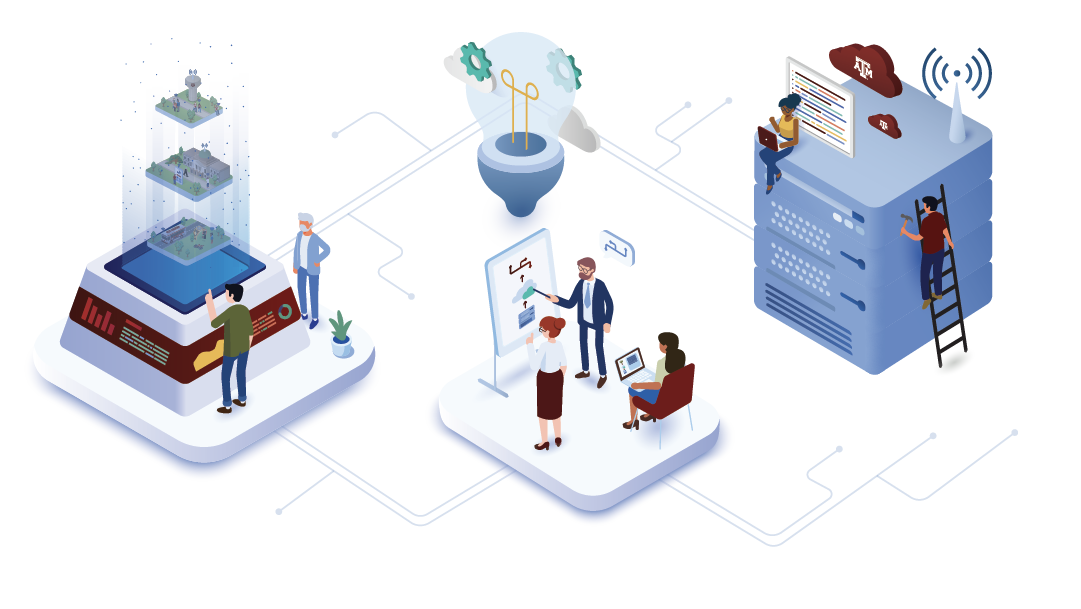
Plans Underway for Next Generation Aggie Network
Designs for the Next Generation Aggie Network are being developed to better meet future demands of Texas A&M educators, researchers and students. Open sessions were held to get feedback from campus members, presentations were made to university stakeholder groups and a user survey was conducted. Campus feedback is being consolidated and an Executive Summary will be presented to the Board of Regents in early 2022.
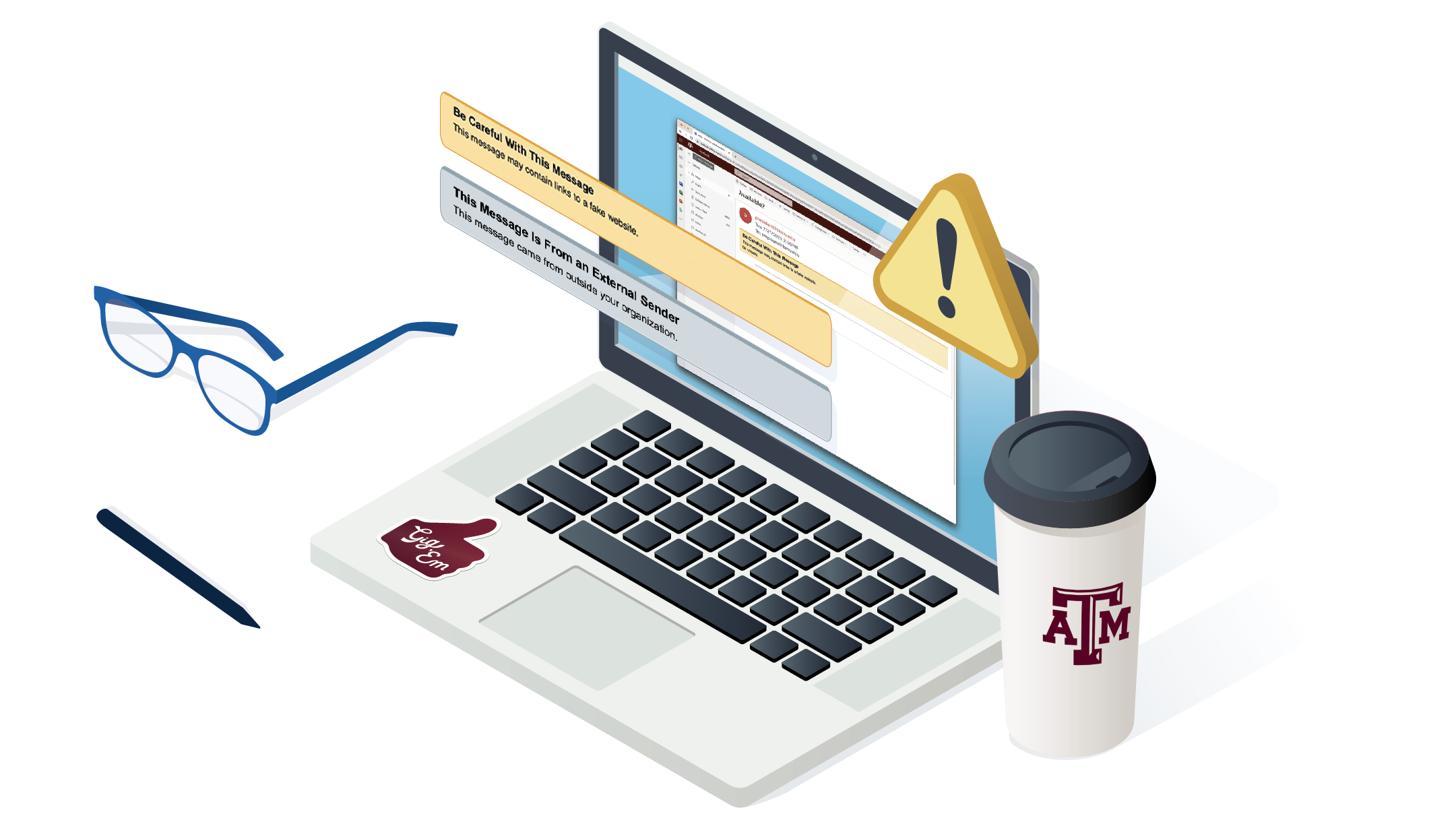
Tags Help Detect Suspicious Email
To help fight phishing, the division activated external sender tags across campus email accounts in October. The tags clearly identify messages received from external or suspicious sources.
New Exchange Restrictions Protect Campus
IMAP and POP3 services on Exchange are now restricted to IP addresses within the United States, Qatar and other territories where Texas A&M has campus locations. The day before restrictions were implemented, an attack resulted in over 900,000 failed IMAP logins and 5,000 locked NetID accounts. After the change, only a single user account was locked due to IMAP failure.
Cybersecurity Apprenticeship Program a Success
The Cybersecurity Apprenticeship Program (CAP) accepted 22 new students to work on live, real-world data. Upon graduation, CAP participants leave Texas A&M security certified with years of deep security experience. The National Security Agency (NSA) has recognized the CAP program.
Prepared for the Future
The division hosted a disaster planning meeting with the IT Advisory Committee (ITAC) to discuss lessons learned from COVID-19 and the unprecedented freeze in February 2021. Attendees reviewed hybrid teaching models and discussed additional support needed to mitigate future disasters.
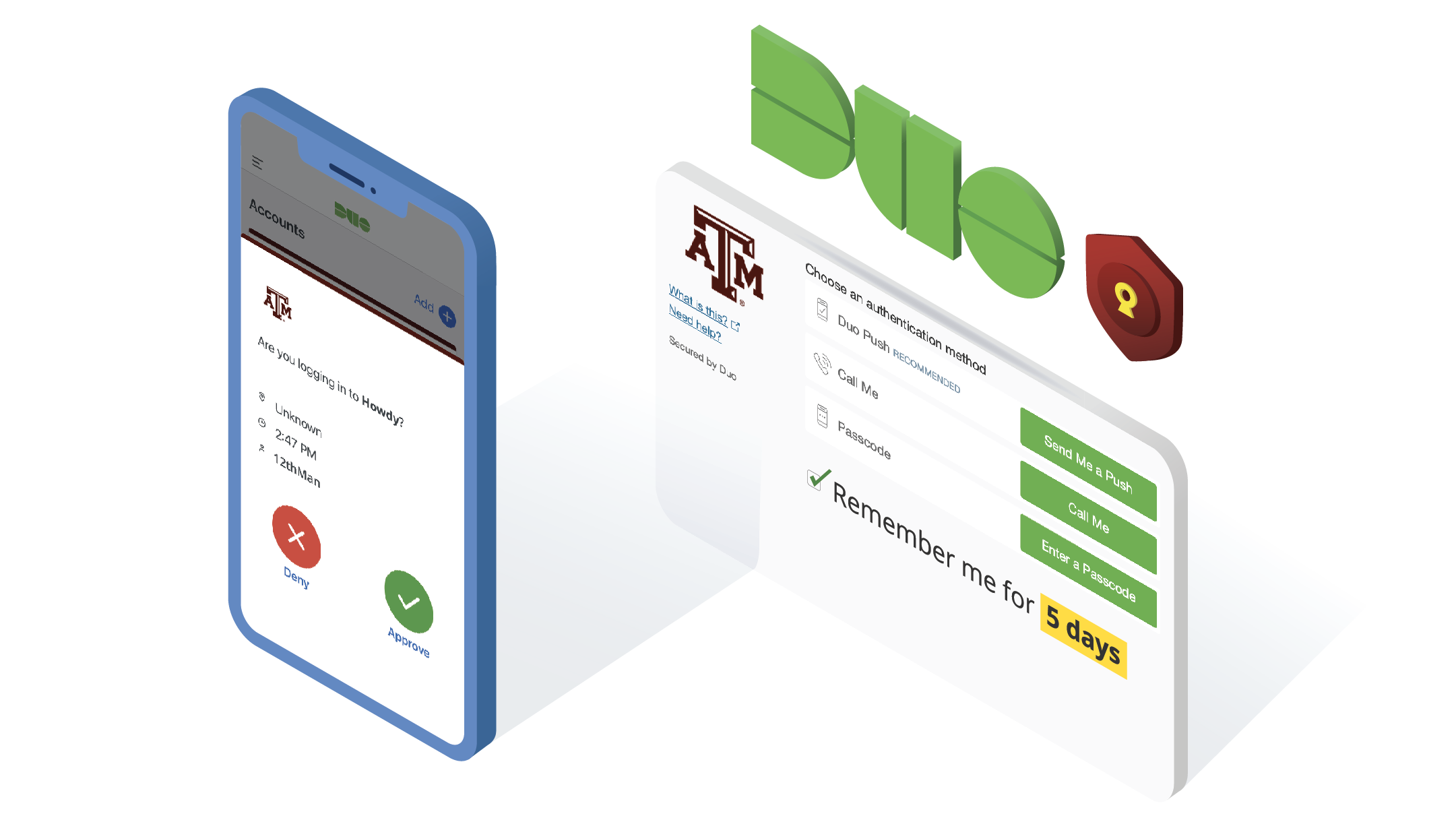
Duo Updates Strengthen Security
Alert notifications are now sent to campus members when a new device is added to their Duo NetID Two-Factor Authentication account. Duo’s “remember me” function was also reduced to five days. The changes were in response to detected phishing attempts aimed at compromising Duo accounts.
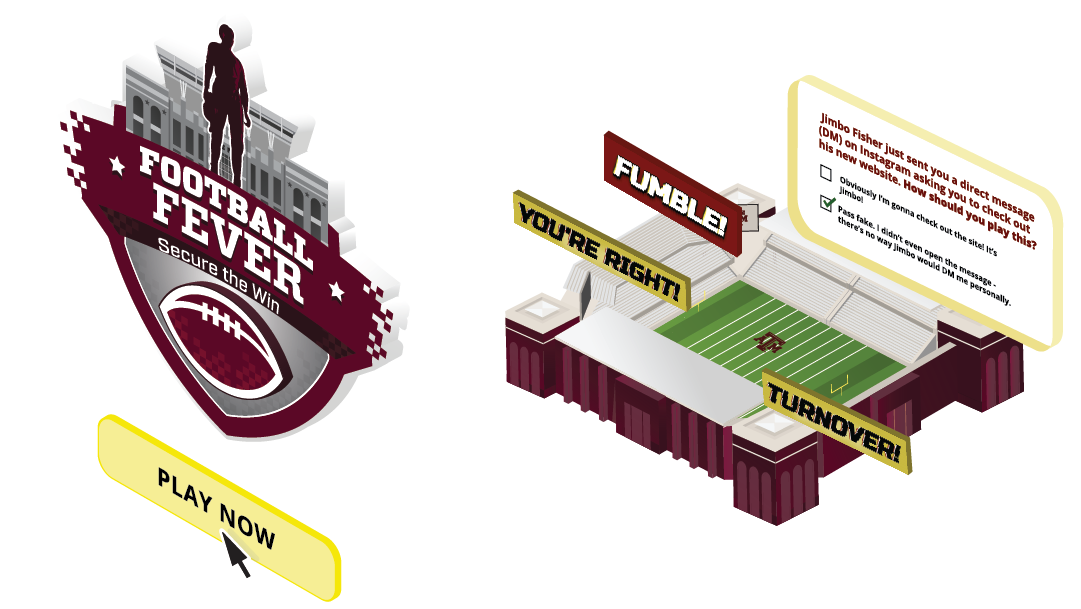
Football Fever Secures the Win
Over 11,000 campus members took to the digital field during the “Football Fever: Secure the Win” cybersecurity campaign in October. The annual event, which coincides with Cybersecurity Awareness Month, tested the security acumen of campus members.
SPF Prevents Envelope Spoofing
The Sender Policy Framework (SPF) authentication method now prevents @tamu.edu email envelopes from being spoofed.
DMARC Email Protocol Enacted
The Domain-based Message Authentication, Reporting and Conformance (DMARC) email protocol was enabled for inbound messages to prevent external domains from being spoofed when sending email to Texas A&M recipients. Once the protocol is fully implemented in early 2022, Texas A&M will be the first university to activate this valuable security feature.
Change to SMTP AUTH Improves Protection
SMTP AUTH now requires approval since it cannot use multi-factor authentication. Campus members already using the service do not require approval to continue using it.
Detecting Sensitive Data Across Campus
The number of endpoints being scanned for PII and other sensitive data with the Spirion Sensitive Data Manager has increased and is now over 12,500 devices.
Firewall Openings Reduced
To reduce the attack surface at the campus border, firewall openings unused for 365 consecutive days are removed. The number of openings has been reduced by about 20%.
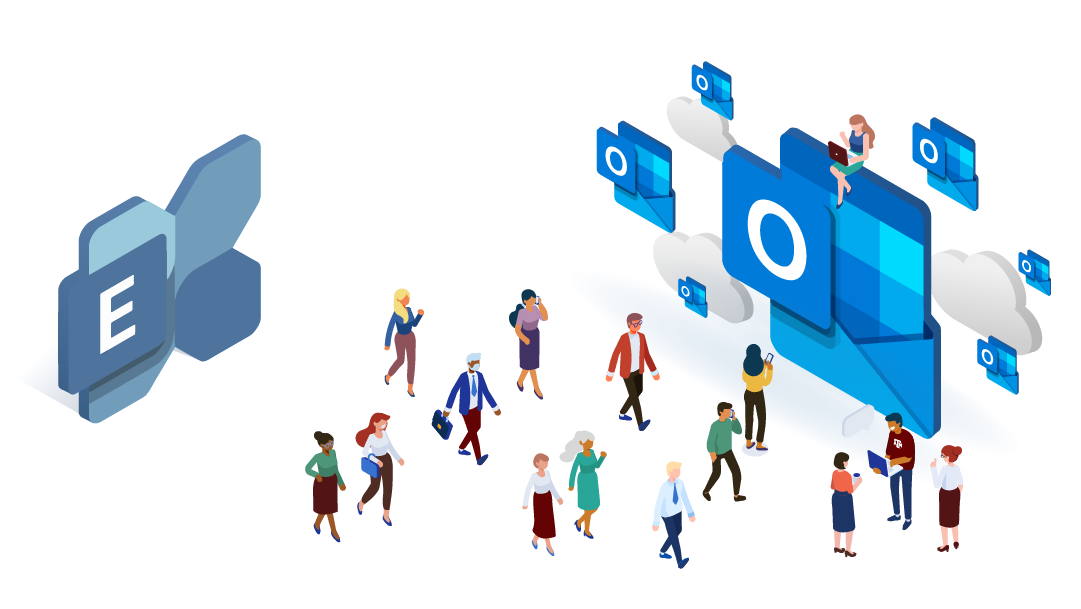
University Moves Email To Microsoft 365
The Division of IT, working closely with technology partners across campus, successfully migrated almost 40,000 mailboxes to Microsoft 365 Exchange Online. This move away from on-premise Microsoft Exchange will save $700,000 annually.
The move also gave users access to new integrated features and functionality of the Microsoft 365 platform. To support the migration, the Division of IT partnered with Microsoft to host an extensive series of live training sessions throughout the summer and fall semesters. Campus members still have access to recordings of each session.
Increased security was another bonus of the move to the cloud, as authentication was updated to Azure Active Directory. Now Microsoft’s AI analyzes logins for password spray and other identity-based attacks.
Texas A&M Embraces Cloud Services
Campus participation in Aggie Innovation Platform (AIP) cloud services (Microsoft Azure, Amazon Web Services and Google Cloud Platform) increased from 86 to 174 accounts, with a 725 percent increase in cloud spend over 2020. AIP’s governance, directory services and security control framework, gives the Texas A&M community a scalable, secure and compliant place to create and innovate with no long-term financial investment risk.
Microsoft Teams Replaces Skype for Business
Microsoft Teams is now fully available to campus for messaging, conferencing and collaboration. The tool replaced Skype for Business when it was decommissioned in October.
Approved Cloud Services Improve Compliance
The division improved a web page listing all cloud services that were reviewed and approved by use according to SAP 29.0103.MO.13 – Cloud Computing Services. The tool lists the date services were approved, the expiration date and the scope of approval.
STRIDES Environment Opens Doors for Biomedical Researchers
Texas A&M University has entered an agreement with the National Institutes of Health - Science and Technology Research Infrastructure for Discovery, Experimentation, and Sustainability (STRIDES) initiative. STRIDES provides access to rich datasets and advanced computational infrastructure for biomedical researchers. The division will release a new STAR/STRIDES environment in Amazon AWS in April.
AIP Supports High Performance Research Computing
To enhance campus research efforts, the Aggie Innovation Platform (AIP) partnered with High Performance Research Computing to run a pilot of RONIN. The managed computing environment assists advanced and high-performance computing environments with sustainability and compliance.
Find Research Resources Based on Data Classification
Researchers can now easily compare different cloud storage solutions based on needed encryption levels and their data classification using the Available Research Resources chart. The chart includes a link to the division’s data classification tool, which helps researchers determine if they are working with public, confidential or critical data. Additional resources will be added as they become available.
STAR Provides New Tools for Researchers
CloudBolt is being implemented by Secure Technologies for Aggies Researchers (STAR) as a self-service component. The move will standardize deployments for common Amazon Web Services (AWS) storage and compute services with the ability to connect across other cloud providers, such as Microsoft Azure.
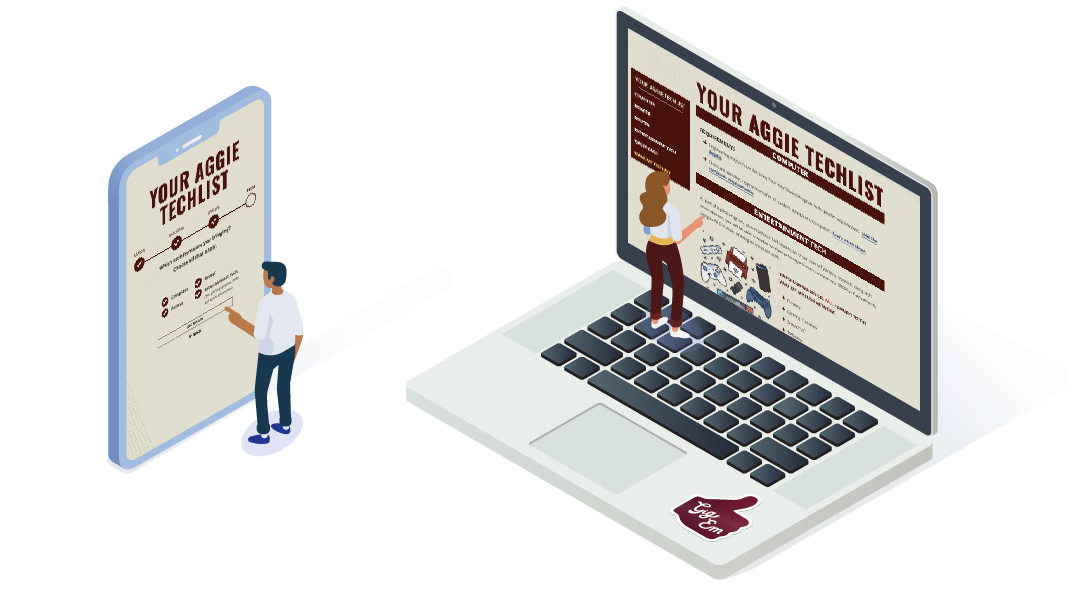
TechList Helps Students Find Campus Tech Necessities
The New Aggie TechList website was released to give incoming students a customized list of IT hardware and software they need based on their major and where they will live. The site was highlighted by Texas A&M Today and featured on the EdScoop website. Before the NewAggie TechList, Help Desk Central received hundreds of calls from incoming students and their parents regarding technology needed for campus.
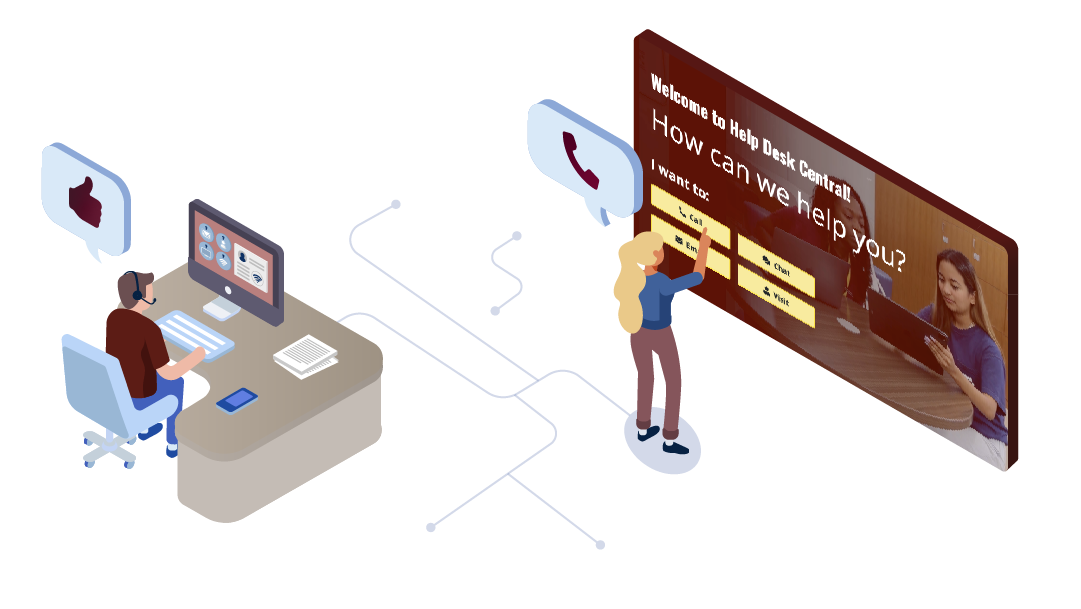
New Website Helps Campus Find IT Support
A redesigned Help Desk Central website was launched in the summer and makes getting assistance quicker and easier than ever. Visitors can search the knowledge base for answers or contact the HDC staff through live chat, email, phone call or in-person visit.
Increased Code Maroon Notification Options
The Code Maroon desktop notification client is now available for personal computers off campus. The new client does not require a Texas A&M VPN connection.
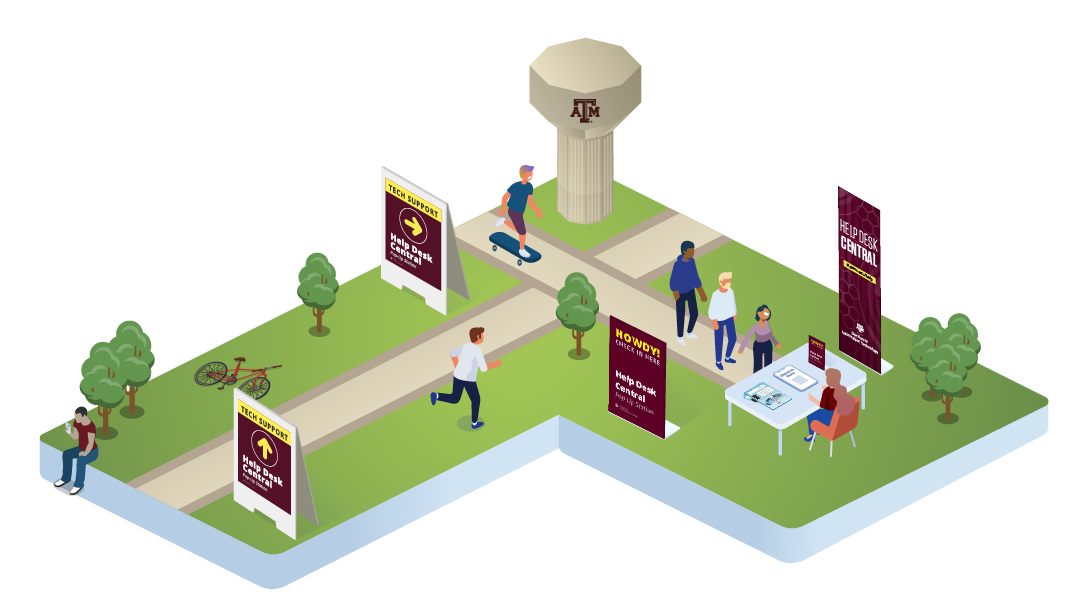
Pop-Up Support
To provide as much student support as possible during Howdy Week, Help Desk Central set up pop-up stations at three locations across campus. HDC personnel helped with such common issues as connecting to Wi-Fi, setting up accounts and changing passwords.
IT Alerts Help Campus Prepare
The division officially launched Enterprise IT Alerts, which allows campus members to receive text alerts when an important campus service is down, including internet, email, Canvas, Howdy, CAS and the campus data centers. Before the promotion, Enterprise IT Alerts had only 22 subscribers. After the promotion, the service grew to over 2,200 subscribers.
IT Governance Optimized and Refocused
IT Governance was restructured to optimize the committee structure and provide clearer areas of focus. A fast-track approval process was introduced to streamline approvals for committee recommendations and a student-focused committee was created to provide input on IT issues that directly impact students.
Microsoft 365 Training Introduces Campus to New Applications and Tools
As campus migrated to Microsoft 365, the division offered a series of free training sessions for faculty and staff. Sessions included in-depth looks at Microsoft Teams, Sharepoint, OneDrive and more. The sessions were offered live through Teams and recordings are still available on the Microsoft 365 website.
TAMU-OPT Announcements Consolidated
A Daily Digest was launched to reduce daily emails to students and faculty by consolidating all TAMU-OPT messages into single lists sent out each day. Readers click on email subjects in the lists that interest them and are taken to the complete message.
Accessibility Innovator Network Created
The GoWeb organization’s Accessibility Special Interest Group has been rebranded as the Accessibility Innovator Network. The network is composed of campus professionals and serves as a means for exchanging ideas, sharing best practices, and promoting access for everyone.

Division Receives “Best of Category” Honors
The National Special Interest Group on University and College Computing Services (SIGUCCS) honored the division with two “Best of Category” awards. The Division of IT 2019 Annual Report was recognized in the “Computing Newsletter” category and the 2020 Computer Lab Signage Campaign took the “Student Created Materials” category.